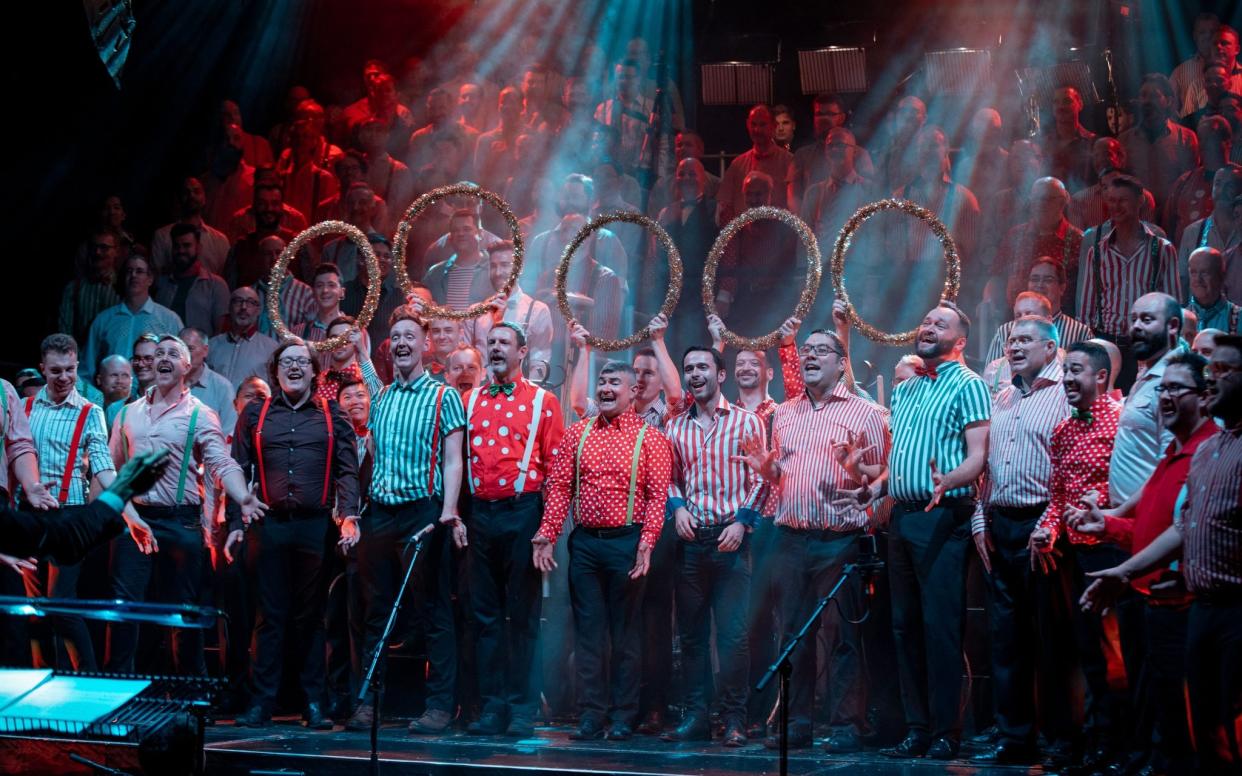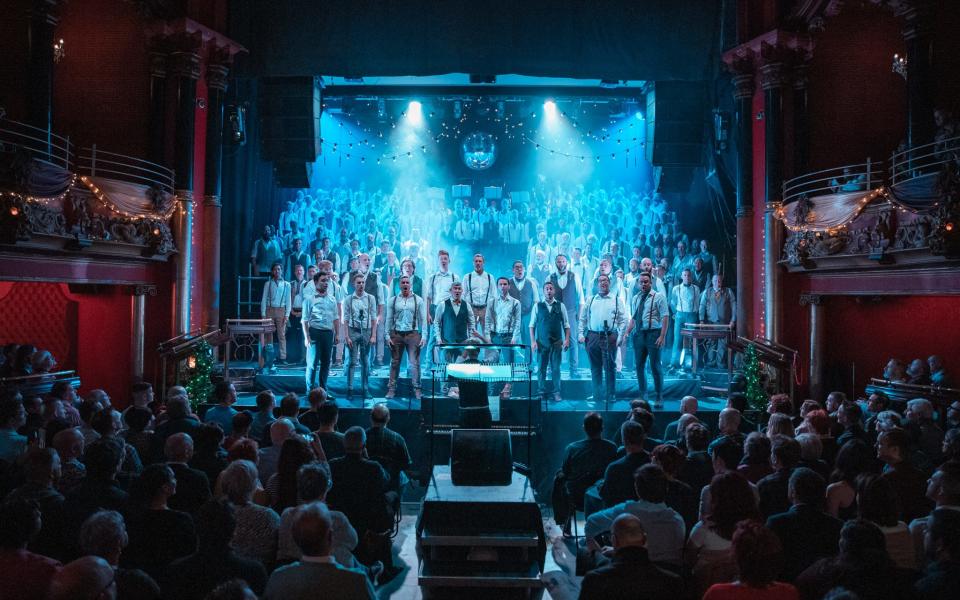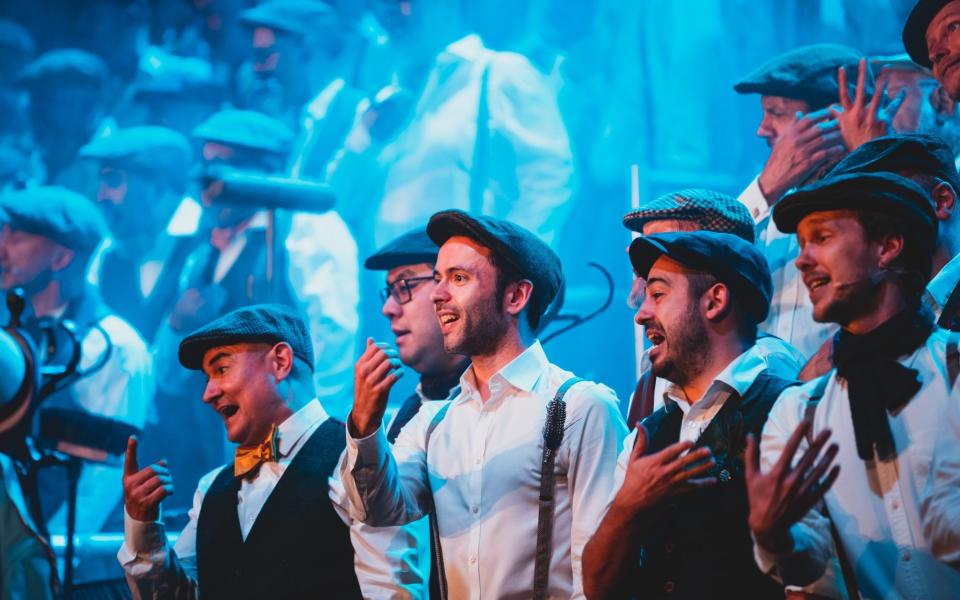‘We’re not just a singing group, we’re a lifeline’: the Gay Men’s Chorus face an uncertain future

If this were a normal year, the 20 men who comprise the ensemble of the London Gay Men’s Chorus would be looking ahead to packed diaries around about now. “There’s usually a lot of gigs: corporate parties, turning on the Christmas lights, we always do [swish department store] Liberty,” says Freddie Porter, a tenor in the group, who can end up performing three nights a week during the festive season. This year, though, the Chorus are looking at a rash of cancellations after a second lockdown put a halt to merriment.
The London Gay Men’s Chorus is one of thousands of performing arts organisations that have had their plans scuppered this year. Founded in 1991, it now comprises 220 gay men aged from 20 to 89 who – in non-Covid circumstances – gather between once and twice a week to rehearse and socialise.
Founded amidst paranoia of the Aids crisis, the Chorus has long offered what member Sam Quinlan (also a tenor) calls “a safe space” for men from all different walks of life to share in the communal joy of singing. For the past 30 years, the Chorus has grown from a handful of friends to a community with legitimate artistic credibility, an international touring schedule and a fearsome waiting list for membership. Weekly rehearsals have been regular enough to set your metronome by – until 2020.
“We were due to rehearse on March 14 and took the decision to stop – it was the first time we have stopped,” says artistic director Simon Sharp, who has been part of the chorus since joining as an accompanist in 2000. “At the time I thought it was an overreaction, but in hindsight it was a sensible decision – we have a wide age range.”
The Chorus have tackled lockdown admirably: rehearsals were heroically undertaken via Zoom from March. In May, a “virtual performance” appeared on YouTube, of stitched-together home footage of the ensemble singing Sara Bareilles' Brave from the comfort of their own homes, uploaded in honour of the courage of NHS staff. As a slew of planned concerts to mark Pride in June were canned, the Chorus started to plot for a “very light hearted, feel-good Christmas show”, and Homo Alone, a night of festive pop songs themed around a social bubble of 16 self-isolating men, was due to open at the Clapham Grand in December, was born.
The insistence that the show must go on – even in the face of yet another return to Zoom-based rehearsals (a phrase that sends shivers down the spine of anyone who has encountered a multi-generational family quiz) with a second lockdown – reflects a gritted-teeth determination seen throughout our embattled performing arts industry. But where London’s Gay Men’s Chorus differs is that it offers something far beyond the thrill of the spotlight or the rush of stage-side endorphins.
“I think for many of our members, Chorus is a really important part of their world,” says Sharp. “For people who don’t have a conventional family set-up, it becomes a bit of a lifeline, and for many it is like a family.” Quinlan echoes his sentiment: “Joining the Chorus has helped me: it’s like a second family.” While project manager Quinlan moved in with his partner just before lockdown, he has been left unemployed by the pandemic. “I lost my job back in May and Chorus has really given me something to focus on, work towards and enjoy.” To have two scheduled international trips, Cadogan Hall, Royal Festival Hall and Hackney Empire shows all cancelled, he explains, was “very winding”.
Speaking of lockdown more broadly, Porter says that the Stay-At-Home measures have hit some members of the gay community particularly hard. “I’m lucky: I have a very accepting family and friendship group, I’m very out and proud. But I can’t imagine what it must be like to be in a situation where you don’t feel safe. If you’re gay and not out but have to spend time locked down with your family, being a person you don’t actually feel comfortable being, or in a house share with people who don’t really understand that you’re gay.”

The Chorus has long functioned as more than a choir – its founding meeting, of just nine members outside the Angel tube station with a sign that read “Gay Men’s Choir” (people stopped and stared, it was a confrontational thing to do,” one member remembered), was intended to raise funds for victims and awareness of AIDs. In the era of Covid, the Chorus’s wellbeing support group has enabled members to support one another by collecting prescriptions and picking up shopping for more vulnerable men in the Chorus. “It’s really good to know that there are people out there thinking about you, or you can get in touch with if you feel down,” says Quinlan.
Much like the rehearsals, the socialising that goes hand-in-hand with Chorus has also moved online. Porter and Quinlan tell me about the Halloween party that happened in fancy dress last week, the “countless” WhatsApp groups and the in-Chorus performances that have kept spirits up. But still, Sharp admits that “it’s been a fraction of the normal experience. But sometimes the connection of faces on a Zoom screen is better than nothing to some of these guys.”
Much as Chorus has long been a place to meet new people and socialise beyond the club scene, the recent pressures on key LGBT Soho venues The Admiral Duncan, Retro and the Kings Arms have nevertheless added a layer of vulnerability to the community. “It just feels that this exacerbates the situation,” says Porter. “London is losing its LGBT fabric and I’m quite anxious to see how that impacts in coming years.”

All of which makes community endeavours such as Chorus even more vital – pandemic or otherwise – even if there’s a challenge in proving the necessity of something that may seem outwardly flamboyant. “It’s hard to argue that this should be a top priority in a crisis like this but it does have huge value,” says Sharp. “It’s not just a singing group, it’s far more than that.”
Providing joy in the face of adversity has long been key to the group’s ethos. “Because we’ve had to live with HIV – and lived with quite successfully now – it’s important to acknowledge [the challenges] but to resist and persevere, as best we can,” says Sharp. “I’m sure some people would have felt that we shouldn’t have met at all this year because of risk but I think what’s important is a balance, and I think for our members as well, it’s about keeping them connected and bringing out any messages of hope and solidarity to the wider community.”
While the Chorus have been “hedging [their] bets” in the run-up to Homo Alone, Porter and Quinlan are insistent that the show will go on. “You could despair about the whole year but the one thing Chorus has done is given us something to look forward to,” says Quinlan, pointing out that 2021 will mark the group’s 30th anniversary. “[Lockdown] won’t harm us,” says Porter, “in December we can hit the ground running and present the show we want to present. We’ll still be able to save Christmas!”
Homo Alone opens at The Clapham Grand on December 20. Tickets
